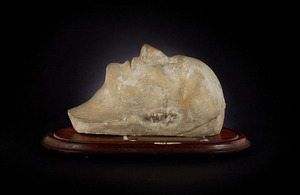At risk: Napoleon’s Death Mask faces export from UK
Ed Vaizey has temporarily blocked the sale of Napoleon Bonaparte's death mask

Napoleon Bonaparte's death mask
Culture Minister Ed Vaizey has temporarily blocked the export of a death mask made of plaster taken from the face of Napoleon Bonaparte, who died on St. Helena on 5 May 1821. Unless a UK buyer comes forward with an offer to match the sale price of £175,100, the mask will leave the UK early next year.
The death mask is a startling portrait of one of the most remarkable figures in European history. Despite being our adversary, he was a hugely important figure for the history of Britain, and for the shaping of Britain’s idea of itself as a pre-eminent nation in the early nineteenth century.
Whilst there are many death masks of Napoleon in existence, the majority are undoubtedly later casts rather than original copies dating from the time of the Emperor’s death. This particular mask is very rare in that it was almost certainly taken by Francis Burton, a British surgeon in attendance at the death of Napoleon, on 7 May. Two copies of this mask were presented to the Reverend Richard Boys (1785-1867), Senior Chaplin of St. Helena. Each bears a note of authentication in Boys’ hand.
This death mask (together with the other cast, known as the Sankey Cast, which was given to Boys’ daughter Mrs Sankey) has been in the possession of the descendants of the Rev. Richard Boys until its sale at Bonhams earlier this year. The Sankey Cast is currently on loan to the Maison Française d’ Oxford, an institution run by the French state.
Culture Minister Ed Vaizey took the decision to defer granting an export licence for the death mask following a recommendation by the Reviewing Committee on the Export of Works of Art and Objects of Cultural Interest (RCEWA), administered by Arts Council England, on the grounds it is so closely connected with our history and national life that its departure would be a misfortune.
Culture Minister Ed Vaizey said:
“ 2015 will see the 200th anniversary of the Battle of Waterloo and there remains a huge fascination with Napoleon here in the UK. This is perhaps one of the most unusual objects I’ve ever come across, both fascinating and somewhat macabre, but I believe it should remain here, and hope a UK buyer steps forward to help ensure that happens.”
Leslie Webster from the RCEWA commented:
“ This extremely rare original cast has a power and immediacy that raises the hairs on the back of the neck; the sense that you are in the presence of Napoleon is very strong. There are many grandiose portraits, as well as contemporary British caricatures of this great and controversial figure, but this deathbed image speaks far more directly to us – here we see the man himself, and sense his charisma, even in death. This is a remarkable and precious survival.”
The decision on the export licence application for the death mask will be deferred for a period ending on 12 January 2014 inclusive. This period may be extended until 12 April 2014 inclusive if a serious intention to raise funds to purchase the death mask at the recommended price of £175,100.
For media information contact: Tamara Salhab, Media Relations Officer, Arts Council England Tel: 020 7973 5189 or 07872 416679 Email: tamara.salhab@artscouncil.org.uk
Notes to Editors
-
Organisations or individuals interested in purchasing the death mask should contact RCEWA on 0845 300 6200.
-
The Reviewing Committee on the Export of Works of Art and Objects of Cultural Interest is an independent body, serviced by Arts Council England, which advises the Secretary of State for Culture, Media and Sport on whether a cultural object, intended for export, is of national importance under specified criteria.
-
Arts Council England champions, develops and invests in artistic and cultural experiences that enrich people’s lives. Between 2010 and 2015, it will invest £1.9billion of public money from government and an estimated £1.1 billion from the National Lottery to help create these experiences for as many people as possible across the country. www.artscouncil.org.uk